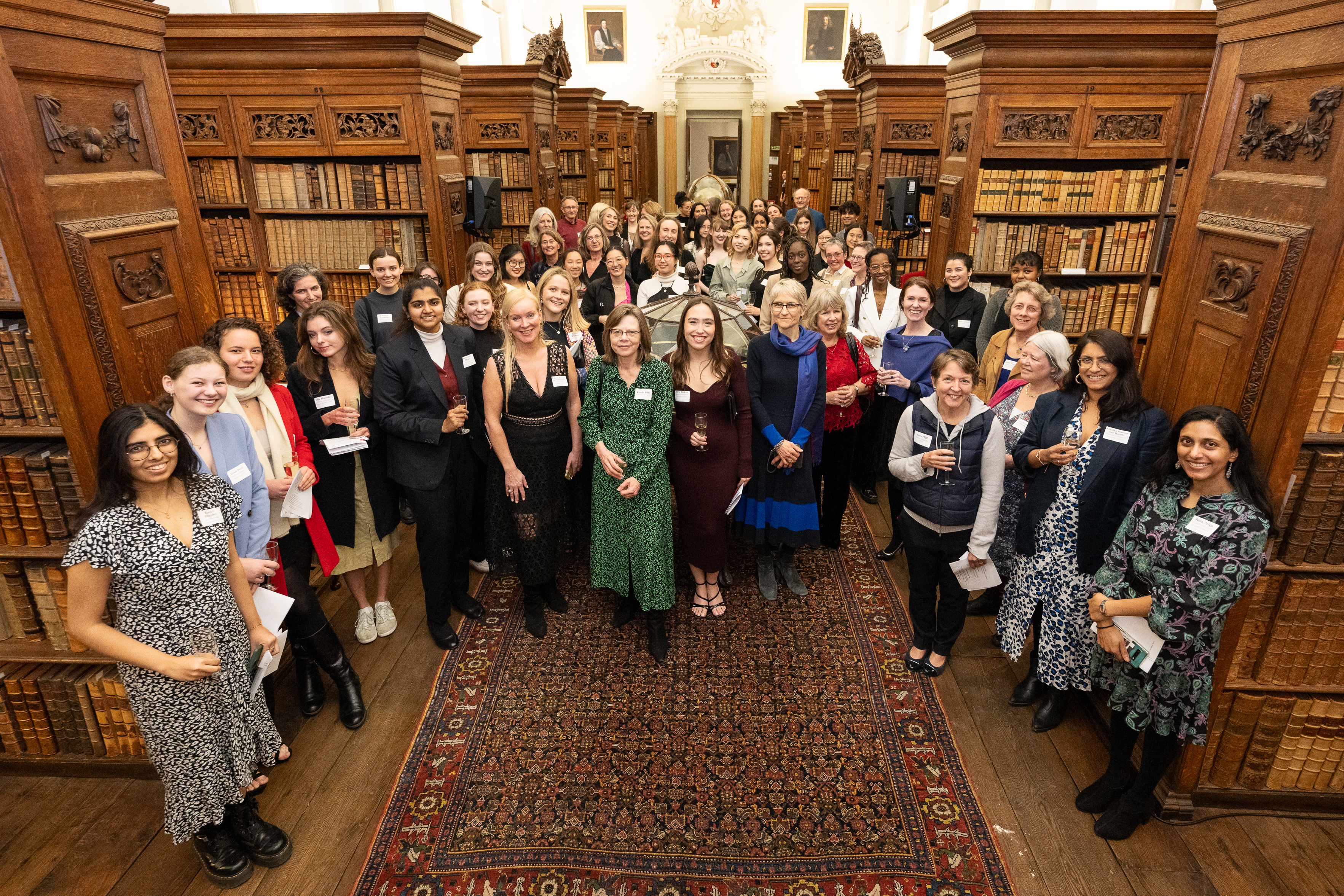Old Member Bill Kroeger read an MLitt at Queen’s and is now undertaking doctoral studies at the University of Toronto. As part of his Earthsongs project, he came back to Oxford in Trinity Term 2024 and we asked him to tell us more about his research.
Tell us about Earthsongs, your workshops on poetry and gardening, and how they relate to your dissertation at the University of Toronto.
Earthsongs is a project that combines gardening and poetry – hopefully to the benefit of both. Historically, some environmental humanists have focused on “nature writing” – narratives and poems that celebrate green life and our experience of it; Wordsworth’s Tintern Abbey is an example. Other environmentalists in humanities fields have defined their work in terms of helping to communicate scientific discoveries and experiments – often by writing essays or stories.
In addition to these valuable projects, ecocritics from Lawrence Buell, Jonathan Bate and Ursula Heise to Donna Haraway and Bruno Latour have attempted to theorise how humans relate with the other-than-human world. Recently, literary theorists such as Caroline Levine have been asking how writers and critics might be able to impact cultural attitudes toward climate and ecology.
Taking up this challenge, Earthsongs focuses on human gardening experiences, especially in terms of relations with other species: we garden and then we write poetry based on our gardening tasks. My hope is that this enables us to rethink material relationships – touching the soil, planting, observing plant-animal symbiosis – through poetic re-imagining of these connections with our community (both human and other-than-human). In other words, our poetry helps us reconsider our ecological interrelatedness, and potentially our cooperation with the places we are inhabiting. The physical materiality of our gardening experiences may also help shape and ground our poetry.
My dissertation is about how ethical ecological relationships are articulated in different genres. Drawing on Potawatomi botanist Robin Wall Kimmerer’s vision of human/other-than-human interconnectedness, I trace how prose novelists, poets, filmmakers, and environmental protesters have reached out to their audiences with implied or overt “calls” to ecological conscience. For example, in addition to Kimmerer’s Braiding Sweetgrass, I work with Richard Powers’ The Overstory, Annie Proulx’s Barkskins, and Toni Morrison’s Beloved – this is the chapter on novels, which emphasises how these writers have envisioned human-tree relations.
I consider the poetry of Walt Whitman, Joy Harjo, and Mary Oliver. I analyse documentary and narrative films – The Biggest Little Farm, The Territory, and Beasts of the Southern Wild. My chapter on protest literature centres around resistance to the conversion of a traditional green quad at the heart of the University of Toronto campus into a single-use artificial turf pitch (in 2013). Although my gardening and poetry project is not technically a part of the thesis, Earthsongs is inspired by Kimmerer’s focus on relation with companion species and local places, and by many of the articulations of relation and ecological conscience in the texts I research.
What has led you to this work?
I have been gardening since just after finishing college: I hoped to grow food that wasn’t produced with chemicals and sold in supermarkets. I have wanted to see whether organic farming could be a way of life. As people realise that agriculture can have a dangerous carbon footprint, there is increasing controversy over what kinds of growing, if any, can be sustainable. With Earthsongs, I am considering this difficult question – which relates to scale, measurement, and scientific observation – from the perspective of how people feel and how they relate to the places they inhabit.
I’ve kept gardening in my life as a way to connect with community (both at Oxford and now at the University of Toronto) and to ground myself with relation to my scholarship. As an amateur poet and teacher of writing, I saw the materiality of gardening as a way to facilitate creative writing – for accomplished poets and new writers alike. At the centre of this project is a question about how different disciplines can connect, and how literary endeavours can bring us closer to our own local communities as well as to the climate crisis we face.
What do you enjoy most about your research?
I like gardening because it provides a chance to engage materially with places and the species around us – to hear and touch and see. I enjoy writing poetry too, especially the release and engagement of allowing myself to be creative. With this project, I am continually surprised at how participants all seem to find new connections when they combine poetry, growing, and thinking about relation – even when they are accomplished in one or all of these fields.
In terms of my dissertation research of ecocriticism and environmental literature, I am excited by the chance to think with eminent ecocritics and literary artists about how cultures are responding to ecological crisis.
You are President of the Graduate Environmental Students Association at the University of Toronto. What does this role involve? And what kinds of action and activities has the Association carried out?
GESA members are students who are connected with the U of T School of the Environment, either working toward their MES (Masters of Environmental Science) or as part of a collaborative specialisation combining environmental studies with their home field. For example, I am pursing a collaborative specialisation in English literature and Environmental Studies.
The Graduate Environmental Students’ Association provides academic and social programmes for GESA members, and these events tend to provide other students on campus a chance to engage with environmental scholarship. This year, we hosted a debate on the relative merits of “green growth” and “de-growth”: the speakers were two U of T professors and a local activist/economist.
GESA also facilitates opportunities for students to learn about Toronto’s ecology and world environmental issues – from farm visits and nature hikes to film screenings and guest lectures. As president of GESA this year, I’ve helped organise these events and tried to provide the kind of programming our members seek.
You are also involved with the U of T/Oxford/UPenn environmental humanities inter-doctoral cluster – what does this cluster aim to do and how?
The interdoctoral cluster creates opportunities for dialogue in the environmental humanities. This includes inviting eminent scholars to lecture virtually or in a hybrid format; Dr Linda Tuhawai Smith, Dr Justin Hosbey, and Dr Amanda Power have all addressed our group recently. The cluster also makes it possible for students to visit each other’s institutions, which can be helpful for learning how this relatively young and developing field is practiced in different places. One of the great things about the cluster is its interdisciplinarity, so that even though we are all roughly described as “humanists,” we benefit from a diverse range of methods, foci, and specific areas of expertise.
What research did you do when you read for an MLitt here at Queen’s?
My MLitt dissertation is an ecocritical reading of Shakespeare’s As You Like It. I suggested that this play is not simply a romantic comedy, but a complex articulation of how diverse and eclectic perspectives connect with each other. I traced how characters were rooted in quite specific historical and/or literary contexts – that Corin is historically related to both the Kenilworth pageant of 1575 and to literary treatments of pastoral in Sidney and Spenser, for example, and that Touchstone’s attention to time evokes cultural transformation of agricultural as well as industrial labor. My reading was ecocritical because I focused on the interconnectedness of characters, their values, and their language in the mutually influencing ecological forest web of Arden, which Shakespeare constructs as a unique setting of personal development and self-discovery.
What’s your favourite thing about Queen’s (and Oxford)?
Just one thing? I will try to relate it with a brief description. One rainy day toward the end of my time at Oxford, I had a number of appointments in college – one of them was with my advisor. I got there early and spent some time in the MCR, and I think I also went to the library to collect or return a book. I often visited the lovely, peaceful, Fellows’ garden, but I don’t think I was there that rainy afternoon… after my appointments, I walked out toward the Front Quad to find a beautiful blue sky and a full rainbow over the chapel (I was on the west side of the quad looking northeast). That’s the moment I remember best, and I relate it because it encompasses a lot of what I remember – the beauty of the grounds, the splendour of the library, and the sense of friendly community that could change your mood like the weather.
I think people recognise how wonderful it is to have a place like Oxford, where so many brilliant thinkers from every discipline can come together to learn and share. Their collective strength enables them to think about goals and solutions with a rare optimism for cooperative action.
At its best, Oxford is a space where unique conversations can happen, where people remember to value their cultural differences, and where people strive to cultivate mutual respect.



